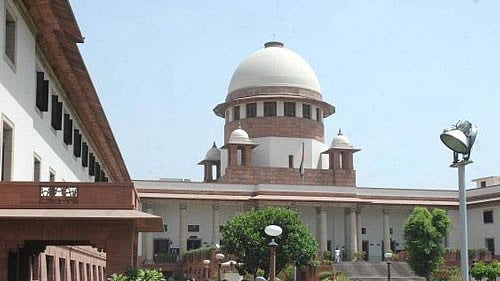
Supreme Court.
Credit: PTI File Photo
New Delhi: The Supreme Court has said merely because the act of an accused is highly insulting due to the use of abusive language, it would not by itself constitute abetment of suicide as there has to be evidence on the intention on their part to instigate the deceased to end the life.
A bench of Justices Abhay S Oka and Augustine George Masih quashed criminal proceedings against the wife and her other relatives for the suicide of her husband, Dinesh on December 9, 2013.
The court held with the very element of abetment conspicuously absent from the allegations made in the FIR, primarily based upon the suicide note, the essential requirements for constituting an offence under Section 306 IPC remained unfulfilled.
"As such, the continuation of the criminal proceedings initiated against the appellants would amount to an abuse of the process of law. The court cannot permit such proceedings to degenerate into instruments of harassment or unjust prosecution," Justice Masih wrote in the April 30, 2025 judgment on part of the bench.
It was alleged the accused had manhandled the deceased on November 10, 2013, used abusive words by calling him infertile and impotent and threatened to release his nude photographs on the internet and get him and his mother jailed in a fake dowry harassment case.
"While the remark allegedly made—questioning the manhood of the deceased could be hurtful and may affect a person’s dignity but it cannot, in itself and especially after a gap of nearly a month between the incident and the suicide, it cannot be construed as a sufficient provocation that would impel an ordinary, reasonable person to take such an irrevocable step," the bench said.
The case was instituted as the deceased Dinesh, who got married to Pushpakalashree, one of the accused on September 15, 2013, left an alleged suicide note. The husband was an engineer and the wife, an MBA.
Setting aside the Madras High Court's refusal on April 13, 2018 to quash the proceedings, the bench found after the said incident of abuse that there has been no contact whatsoever either in person or by phone or any other means between the deceased or his relatives and his wife or any of the other accused which would indicate continuous harassment or torture or any sort of pressure at the hands of the accused appellants on the deceased.
The court said merely on the basis of the allegations of harassment and that too a month ago with in between there being no contact of any sort on the part of the appellants, till the time of occurrence which can be said to have led or compelled the deceased to have committed suicide, the offence has not been made out.
"Mens rea cannot be presumed, but must be ostensibly present and visible, which is missing in the present case. It involves a mental process of instigating a person and without a positive act on the part of the appellants which can be said to either to instigate or aid in committing suicide, the ingredients of the offence cannot be said to have been present," the bench said.
The court pointed out that the essential ingredients of the offence under Section 306 IPC are the abetment; the intention of the accused to aid and instigate or abet the deceased to commit suicide.
The said ingredients having not been fulfilled, further continuation of proceedings would not be sustainable, it held.
